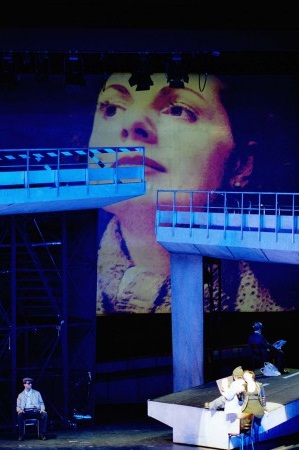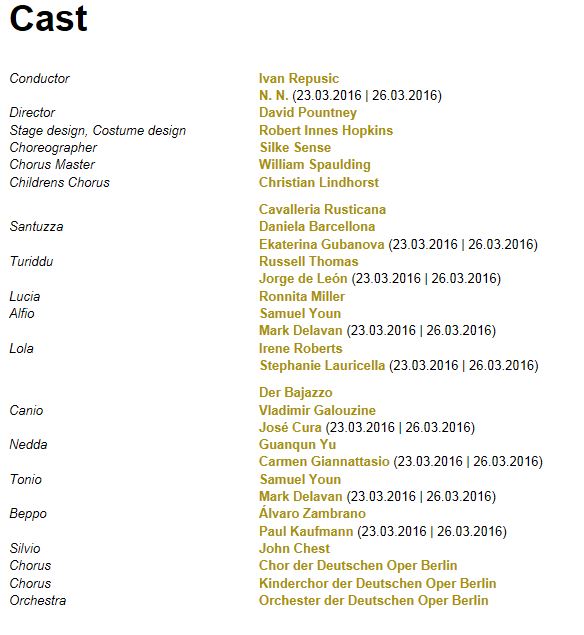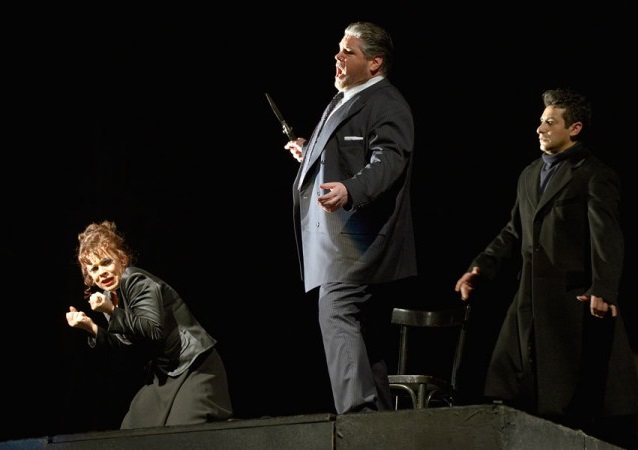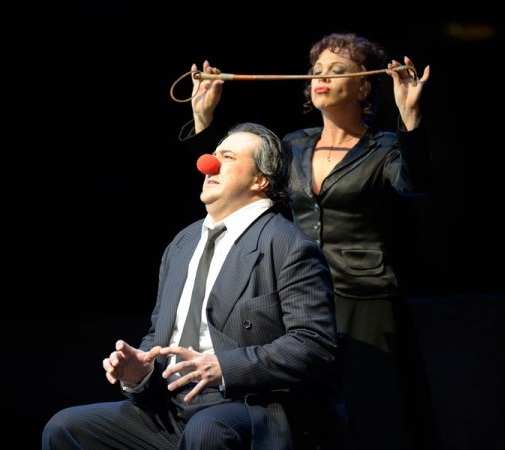By Tiziano T. Dossena —
Pietro Mascagni (1863 – 1945) / Ruggero Leoncavallo (1857 – 1919)
“Cavalleria Rusticana”
Melodramma in one act by Pietro Mascagni
Libretto by Giovanni Targioni-Tozzetti and Guido Menasci, based on an novel by Giovanni Verga
First performance on 17. May 1890 in Rome
Premiered at the Deutsche Oper Berlin on 23. April 2005
“Pagliacci”
Drama in two acts by Ruggero Leoncavallo
Libretto by Ruggero Leoncavallo
First performance on 21. May in Milan
Premiered at the Deutsche Oper Berlin on 23. April 2005
In Italian with German and English surtitles
Performances
| Sun 13. September 2015 | 19:30h | |
| Fri 18. September 2015 | 19:30h | |
| Wed 23. March 2016 | 19:30h | |
| Sat 26. March 2016 | 19:30h |
3 hrs / 1 interval
Information
It can be comforting to know that the tears dropped onstage are fake, the emotions only acted, and that the pains of the performers have not really been endured. Reassurance, however, was not the object of the young Italian composers on the cusp of the 20th century, on the contrary: they wanted to arouse the spectators, involve them in vortexes of feelings, take them by surprise with the comic and tragic turnarounds that their stories, copied from Life, take.
In the literary movement of ‘verismo’ [derived from ‘il vero’ = the True/the truth] they found their concern preconceived, and it is only consequent that Pietro Mascagni chose a novella by the principal interpreter of verismo, Giovanni Verga as a model for his first work. Cavalleria rusticana [the German title is Sicilian Peasants´ Honor] had already proved its stage suitability in a dramatized version, which had also been shown in Livorno, Mascagni’s home town. In 1880, the story had been published in the anthology Vita dei campi, which actually means Life in the Countryside, but it is most frequently translated as Sizilianische Dorfgeschichten, Sicilian Village Stories in the German version, on account of the author´s origin.
In 1888/89, Mascagni´s first work won the composition competition for one-act operas organized by publisher Sonzogno with ease. His extremely successful debut performance in the Roman Teatro Costanzi on May 17, 1890 may be considered the birth hour of musical ‘verismo’.
More than two years later, Ruggero Leoncavallo wrote the short opera I PAGLIACCI containing the renowned prologue. The German title DER BAJAZZO correctly names the main character in the singular form, however, the plural form in the Italian original was enforced by the famous singer Victor Maurel, who had to sing the prologue as Tonio and whose role would not otherwise have appeared in the title of the work.
The sung prologue contains the credo of ‘verismo.’ “The artist is a real person who must write for real persons….We are people of flesh and blood, and we breathe, exactly the way you do, the breath of this lost world.” Leoncavallo employs a dialectic trick; in his story that so closely resembles one of the typical newspaper “miscellanies”, the tragedy intensifies exactly because the person who enacts PAGLIACCI performance is no longer able to differentiate between play, and the gravity of the situation.
 The combination of these two culmination points of musical ‘verismo’ in the double bill, performed in English under the abbreviation “CAV & PAG”, has established itself since the beginning of the 20th century. Like twins, they closely resemble one another and yet could not be more different: the overture is interrupted by singing, an interlude connects both acts (needless to say, CAVALLERIA RUSTICANA is also two acts long, the competition rules had simply necessitated that ‘in one act’ be written on the title page). Southern Italian ambiance is displayed in the authors´presence, and there are genre choir scenes with descriptions of the scent of oranges, or of ringing church bells. But on the other hand, we find a late Belcanto flowering with Mascagni, Leitmotifs and a diversity of orchestra effects with Leoncavallo; here, a dominance of the church and close-fisted morality comparable to Garcia Lorca, there, full-fledged vitality and the desire for pleasure.
The combination of these two culmination points of musical ‘verismo’ in the double bill, performed in English under the abbreviation “CAV & PAG”, has established itself since the beginning of the 20th century. Like twins, they closely resemble one another and yet could not be more different: the overture is interrupted by singing, an interlude connects both acts (needless to say, CAVALLERIA RUSTICANA is also two acts long, the competition rules had simply necessitated that ‘in one act’ be written on the title page). Southern Italian ambiance is displayed in the authors´presence, and there are genre choir scenes with descriptions of the scent of oranges, or of ringing church bells. But on the other hand, we find a late Belcanto flowering with Mascagni, Leitmotifs and a diversity of orchestra effects with Leoncavallo; here, a dominance of the church and close-fisted morality comparable to Garcia Lorca, there, full-fledged vitality and the desire for pleasure.
Photos: © Bettina Stöß; Kontakt: bettina@moving-moments.de / StoessBetti@gmx.de
Accompanying Programme
Pre-performance lecture (in German): 45 minutes prior to each performance














